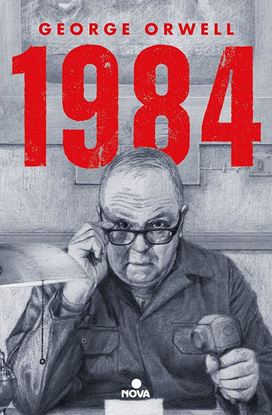

LA HIJA DEL COMUNISTA
Berlín, 1956. La tarde con más frío de todo el invierno, las manos de una niña se ensucian de carbón. Berlín, 1958. En esas mismas manos hay un secreto o un recuerdo, una insignia con tres letras grabadas: PCE. Berlín,1961. La sangre de las sardinas ha quedado al otro lado porque un muro ha partido la ciudad en dos. Berlín, 1968. ¿Has pensado en lo que significa estar aquí para siempre? Berlín, 1971. Qué cosas se llevan en los viajes, cuando se huye, cuando no será posible el regreso.
La vida de Katia podría haber sido contada de muchas formas, pero la prosa de Aroa Moreno Durán, incisiva y brillante, nos la cuenta de este modo: devolviendo la belleza al peso de la Historia.
995
1984 (EDICION ILUSTRADA TD)
Año 1984. Londres es una ciudad lúgubre en la que la Policía del Pensamiento controla la vida de los ciudadanos. Winston Smith es un peón de este engranaje perverso y su cometido es reescribir la historia para adaptarla a lo que el Partido considera la versión oficial de los hechos. Todo cambia cuando decide replantearse la verdad del sistema que los gobierna.
1,850
PARTIDA FINAL (BOL)
Un cuarto cerrado. Un cadáver. El secreto que se llevó a la tumba.
Cuando encuentran al agente retirado Finlay Shaw muerto en una habitación cerrada, todos piensan que se trata de un suicidio. Pero el detective William Fawkes, alias Wolf, no está tan seguro, pues sabe que Shaw nunca habría dejado a su mujer Maggie, su compañera de vida.
Fawkes, que se ha entregado a la policía para saldar algunas cuentas pendientes con la justicia, consigue un permiso especial para hacerse cargo de la investigación del que fuera su mentor. Pero, ¿era Shaw tan intachable como aparentaba? ¿O puede que hubiera algo en su vida que jamás le contó a nadie?
Wolf se sumerge en el caso con la ayuda de la detective Emily Baxter y sus colaboradores habituales, pero su regreso no es bien recibido por todos. A medida que rebusca más y más en el pasado de Shaw, el policía saca a la luz un entramado de corrupción que pone en juego su vida y la de quienes le rodean.
800
LA CHICA ITALIANA (LI) (BOL)
Rosanna Menici es muy joven cuando conoce a Roberto Rossini, el hombre que le cambiará la vida. En los años siguientes, sus destinos se verán entrelazados por sus extraordinarios talentos como cantantes de ópera y también por su incombustible pero obsesivo amor, un amor que acabará afectando las vidas de todos los que los rodean. Porque, como Rosanna descubrirá poco a poco, su unión está marcada por terribles secretos del pasado...
Desde las pintorescas calles de Nápoles hasta los deslumbrantes escenarios de los más prestigiosos teatros del mundo, el viaje de Rosanna es una emocionante historia de pasión, traición y autodescubrimiento.
550
LAS CRONICAS DE EMMY LAKE (BOL)
Londres, noviembre de 1941. Tras la salida de la formidable Henrietta Bird de la revista Woman's Friend, las cosas están mejorando para Emmeline Lake mientras asume el desafío de convertirse en una joven columnista de consejos en tiempos de guerra. Su relación con su novio Charles va viento en popa, mientras que Bunty, su mejor amiga, todavía se recupera de las secuelas de los bombardeos alemanes en territorio inglés, procurando mirar valientemente hacia el futuro.
Cuando el Ministerio de Información pide a las revistas de Gran Bretaña que ayuden a reclutar a mujeres trabajadoras como soporte en la contienda bélica, Emmy decide dar un paso al frente y ayudar. Sin embargo, ella y Bunty conocerán a una joven que les mostrará los desafíos reales a los que se enfrentan las trabajadoras de guerra y Emmy deberá abordar el dilema de si cumplir con su deber profesional o bien apoyar con sus amigas, algo que cambiará su vida para siempre.
Tan conmovedora y tierna como Querida señora Bird, esta novela es una celebración de la amistad, un testimonio de la fuerza de las mujeres y de la importancia de ayudarse mutuamente, siempre, y también, en los momentos más difíciles.
750
DESPUES DE QUERERTE (ARMAS 3) (BOL)
Para Maday, Airam era un sueño imposible.
Para Airam, Maday era el sueño que algún día haría realidad.
A lo largo de quince años de amistad, sus caminos nunca han coincidido, como si su historia estuviera destinada al fracaso. Pero a pesar de separarlos el rencor, la distancia y una vida separada, cada vez que se reencuentran regresan al pasado. Un pasado donde pudo ser todo. Un pasado que ambos tienen muy presente.
Él solo quiere olvidar.
Ella necesita pasar página.
PERO DONDE HUBO FUEGO SIEMPRE QUEDAN CHISPAS...
750














